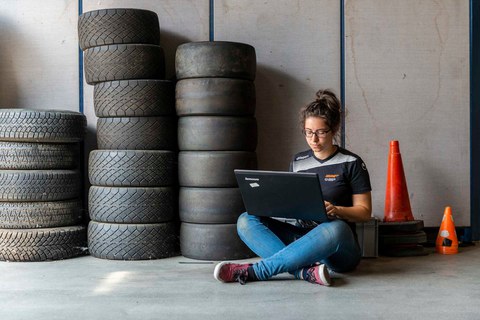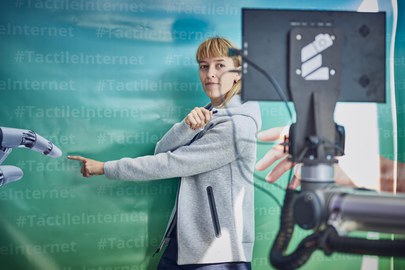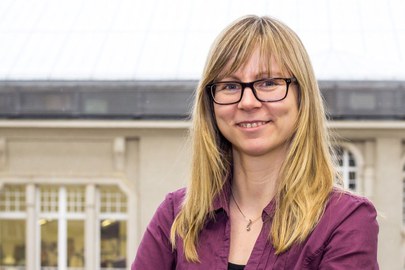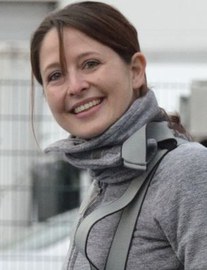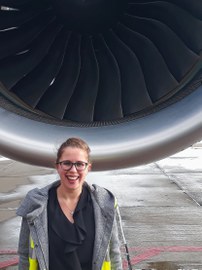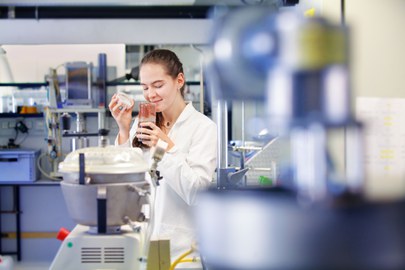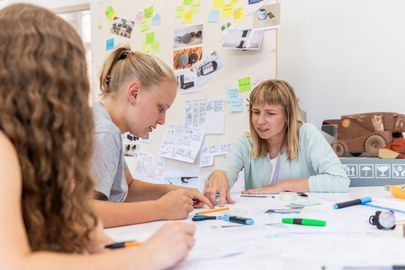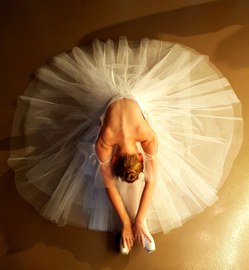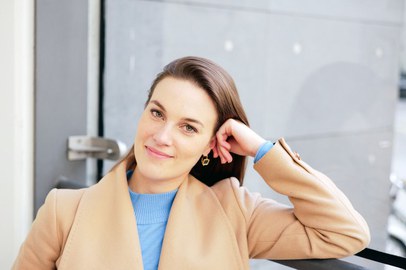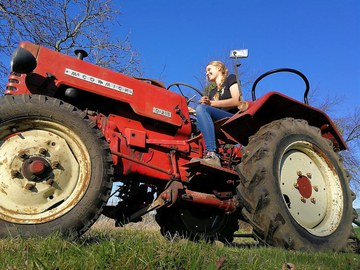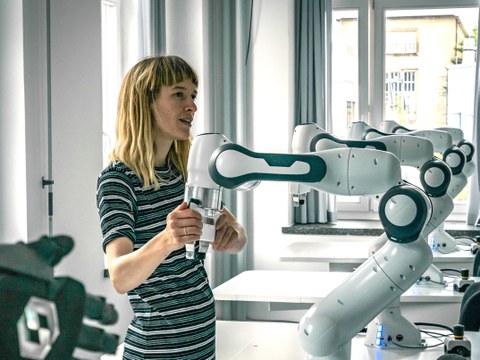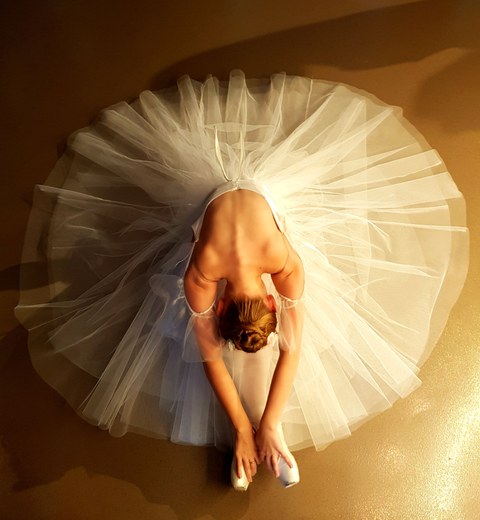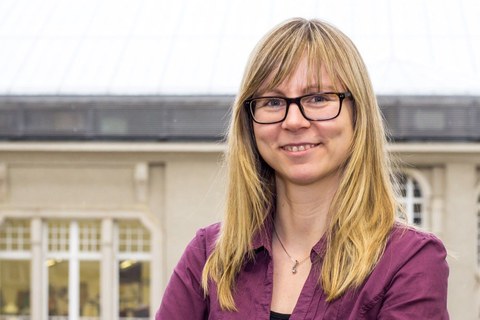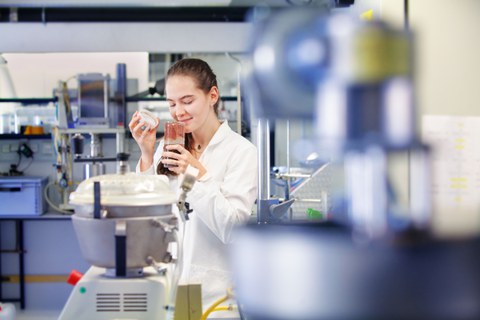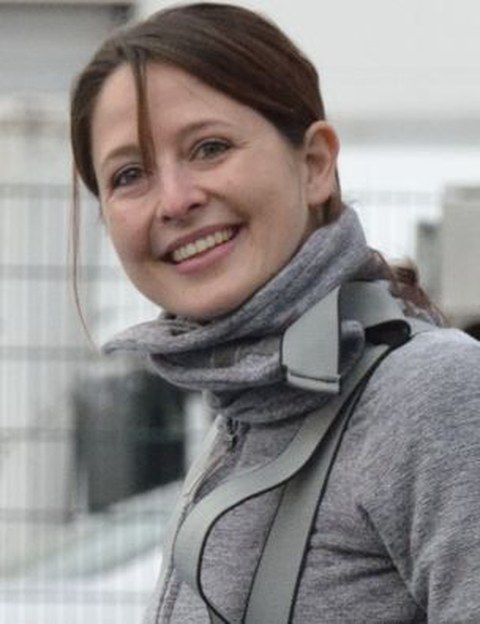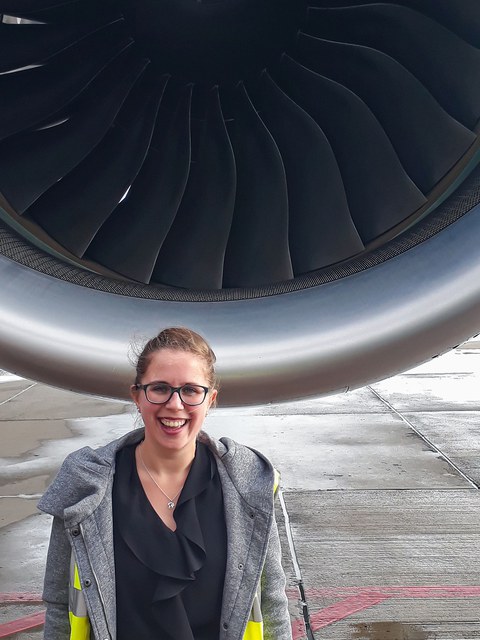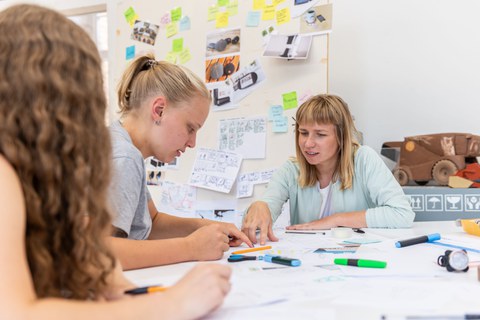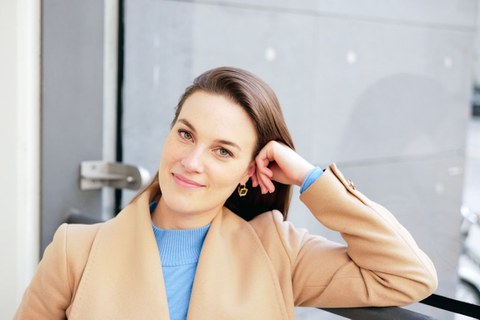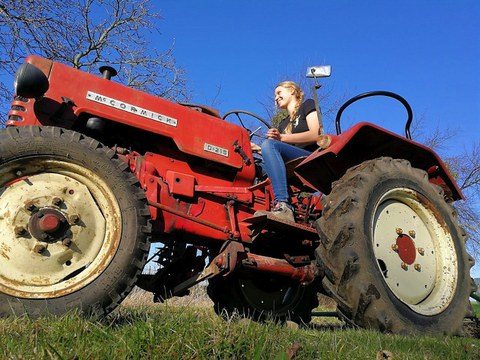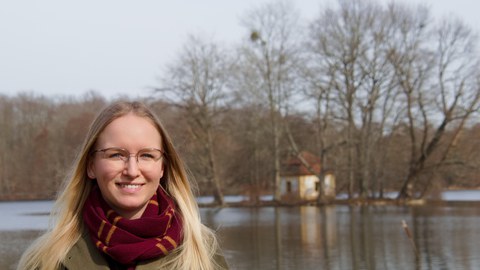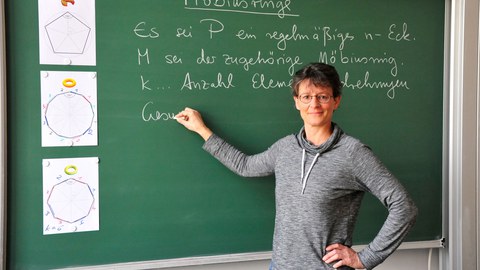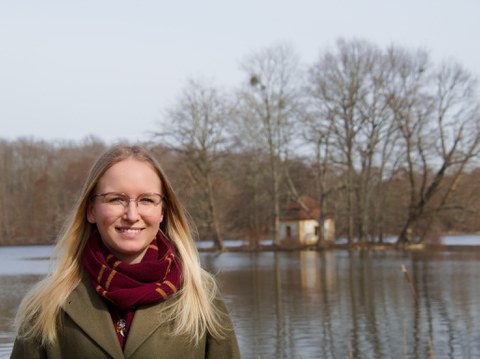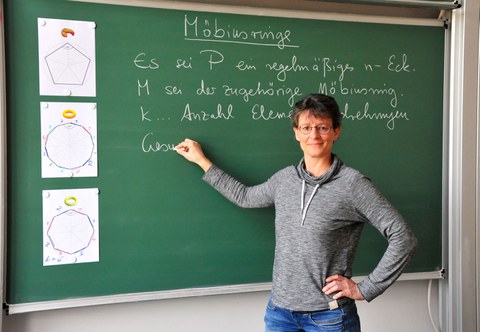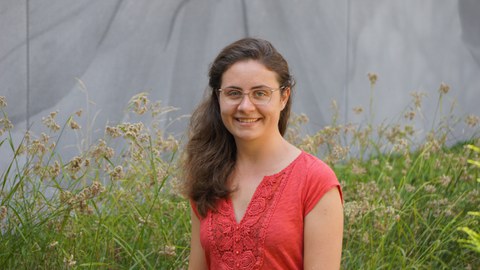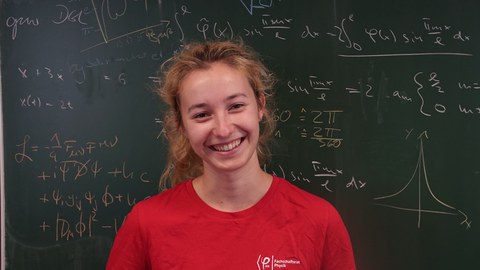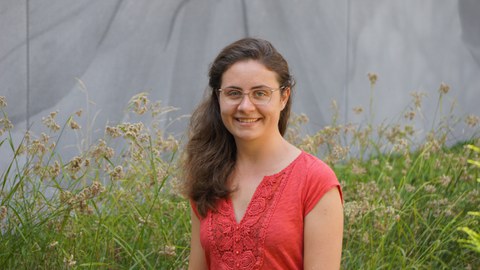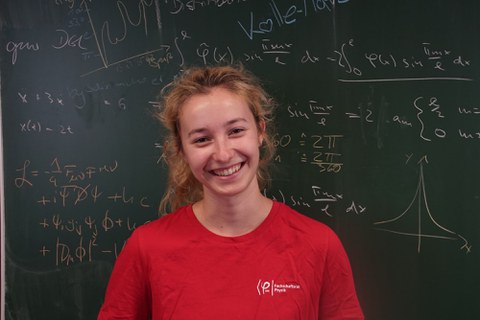STEM profiles
Table of contents
Deciding to study at a university sets the course for your entire future. In STEM subjects in particular, women are still frequently underrepresented. TUD strives to inform young women about the opportunities available to them and to encourage them to pursue a degree in a technical or scientific field. Increasing the visibility of women role models and disseminating information about future study content as well as practical experience and knowledge of potential areas where STEM can be applied in “real life” are essential building blocks. On this page, we introduce you to some fascinating women who are working or studying in STEM fields.
Engineers
Tina Bobbe
Research Associate at the Chair of Industrial Design Engineering
With my predilection for math and physics, I began studying mechanical engineering in Berlin. My choice was largely due to the myriad of opportunities for specialization in mechanical engineering. The plan was a success: A few semesters later, I heard about industrial design engineering at TU Dresden, a field where the constructive development process and creative industrial design meet. We consider the needs of society all the way down to the user before coming up with a concrete product concept. In my Diplom thesis, I worked with refugees in Dresden to develop simple solutions on location. Since then, I have been working at the Chair of Industrial Design Engineering at TU Dresden, where I am doing my PhD on how industrial design can contribute to the dialog between contemporary science and society. More specifically, my topic is the "Tactile Internet," which will enable many novel applications for people in the future. Developing these technologies responsibly and in collaboration with society is central to the CeTI Cluster of Excellence (ceti.one).
Alona Chesnok
Student of Transport Engineering
Ballet and planning the mobility of the future – aren't these two things incompatible? After graduating from high school, I didn’t really have a plan. I studied math and physics as advanced courses and wanted to try studying engineering. I knew that TU Dresden had a good reputation and I had a look at what degree programs they offer on the website. Transport engineering sounded multifaceted, interesting and relevant to the future. Only at TU Dresden, they offer this degree program as a Diplom, and a particularly intensive one at that. I like the wide range of possibilities it offers. Undergraduate studies provide an insight into all areas: Road, rail, air and even water transportation were all part of the program. Other than that, you have to take engineering subjects such as math, physics, technical mechanics, computer science, etc., but these make up only a fraction of the program. In lectures such as “The Environment and Traffic,” “Telematics,” “Traffic Economics” and even “Traffic Psychology,” on the other hand, you learn so much about modern transportation. And whatever you like here, you can pursue in more depth as a specialization from the 5th semester onwards.
Dr. Anja Winkler
Research Associate at the Institute of Lightweight Engineering and Polymer Technology
How does a plane or a steam turbine work? What role do materials, construction, and manufacturing processes play? How is it possible that I can get from A to B in a car or a train? How does a plane fly? These are all questions that I kept asking myself and that I wanted to understand for myself. This is why I started studying mechanical engineering, here a lot of math, physics, mechanics, and electrical engineering laid the foundations for my later specialization. Studies in light-weight construction offered me the greatest variety and also the most interesting topics to satisfy my thirst for knowledge. The core topics of light-weight construction are not only light and strong materials, but also the determination and calculation of their properties, the design of components and systems depending on their external load, and simulation as a means of designing components and predicting critical states. Other topics, such as electromobility or artificial intelligence, also come into play, raising an infinite variety of questions and approaches. The mix of classic technical tasks combined with new approaches, such as the integration of sensors and actuators in critical components to record their status, is something I always find interesting and motivating.
Thanks to the variety of subjects I deal with on a daily basis, I have learned a lot in both my professional and everyday life and can now find the answers to my everyday questions from the knowledge I have acquired.
Josephine Mehlhorn
Student of Process Engineering and Natural Materials Technology
I always loved getting creative in the kitchen. Chocolates, cakes, bread, and yogurt – not only do they taste better homemade, I've always enjoyed making them myself. But I wanted more. More knowledge, for instance about how pralines, which take me hours to make, can be produced in their thousands per hour. More understanding about why milk is liquid but yogurt is solid. And do I want to spend my whole life dedicated to food or is this just a phase? After graduating from high school, I wasn’t so sure. TU Dresden provides a very flexible degree program with the Process Engineering and Natural Materials Technology program. During the first four semesters, there is time to study engineering in general and to get a taste of a wide variety of subjects, such as biotechnology, wood and fiber material technology or food technology, before deciding which field you want to pursue. I’m very happy with my decision to continue focusing on food. At the Institute of Food Chemistry we learn more than just the basic processes – we also learn what lies behind the operations. Of course, gaining experience plays a major role. The many excursions, internships, and food tastings made learning easier. The latest research is also not neglected. The holistic use – and therefore the careful use of resources – and the development of new uses for food is a particularly important topic.
Prof. Nadine Bergner
Chair of Didactics of Computer Science
I am the Chair of Didactics of Computer Science at TU Dresden. And I myself would never have expected this! I graduated from high school in 2005 and then enrolled at RWTH Aachen University to become a teacher of math, computer science, and physics. The decision to study computer science was more of a coincidence, as I wanted to try something new. At that point, I still knew nothing about programming or how a computer is built. I was so inspired by this subject during my studies that I really wanted to share it with others. That's why I decided to do my PhD about a computer science lab for children in 2010. As a Research Associate, I was able to show students, children, and young people how exciting and versatile computer science is. After a few challenging years, I completed my doctorate in 2015 and in 2019 I had the great opportunity to take up a Chair at TU Dresden.
Anna Simon
Student of Transport Engineering
Over 5 years ago, when I first decided to enroll in the Transport Engineering Diplom degree program at TU Dresden, I had no idea where this decision would lead me. Given my fascination for aviation and the complexity of international air traffic, the decision to specialize in transport systems engineering and logistics in air traffic was quickly made. Who wouldn’t like to know how an airplane is able to fly, how an airport works and, above all, why, despite the vastness airspace, there is always talk of capacity problems over Europe? Starting with the first aviation lectures and practicals in the flight simulator at the Friedrich List Faculty of Transport and Traffic Sciences, then on to participation in the German Aerospace Center's Summer School with flight tests at Braunschweig Research Airport, a one-year study visit to Loughborough University in England and an internship at the operating company of Germany's largest airport, Fraport AG, I am now almost at the end of my studies and am in contact with various industry partners as well as the European organization for aviation safety, EUROCONTROL, to develop a new concept for a previously unresolved problem in the area of flight approach management as part of my final thesis – something I could never have imagined at the beginning of my studies!
Nele Liebold
Student of Mechanical Engineering
Why did I decide to study Mechanical Engineering after graduating from high school? I enjoy math and am really interested in technology. Although this may sound rather simplistic, it actually hits the nail right on the head. I’m about halfway through my studies now. I have completed my foundation studies. I can build on the basics, like math, technical mechanics, design theory, electrical engineering and much more. But one topic that was seminal to me is not on this list: Manufacturing. I found this subject extremely fascinating and it was the decisive factor in my decision to specialize in production engineering. What captivates me about production engineering is the holistic view of a product's life cycle. What parameters must be taken into account when designing and selecting manufacturing processes? How are the parts manufactured? Which machinery can be used for production? How long do the individual production steps take? Which parts does a company manufacture itself and which are purchased? ... Questions upon questions – the answers to which I look forward to discovering in production technology.
Natalia Bienkowski
Research Associate at the Institute of Construction Management
Originally, I planned to study fine arts or, alternatively, architecture. Since it takes about a year to prepare an application portfolio for art school, and studying architecture is expensive because you have to make models and plots, and the job opportunities after graduation are slim, I decided against both. In contrast, there were excellent job opportunities in civil engineering. I was familiar with the subject because I knew two civil engineering students, and in the end I decided to study at TU Dresden. I have never regretted my decision, even though the program was challenging in the first few semesters because of all the coursework and exams in technical mechanics and math, for example. I’m sure the fact that I studied math as an advanced course in addition to art helped me out. I have found my passion in the "Construction Management" specialization, especially project management, construction execution and the relevant construction law issues. The focus here is on the cost estimation and scheduling for construction sites, the planning of construction site facilities, and project and construction management during the construction phase. I have been working at the Chair of Construction Management at the Institute of Construction Management since 2016 and am involved in research, teaching and working on my doctoral thesis. When it comes to teaching, I am responsible for the subjects of "Demolition and Recycling" and "Pollutant Remediation" – topics that I definitely wouldn't have been particularly interested in after leaving school. In the course of my work, I have been able to prove time and again how exciting these topics are.
Annelie Dörheit
Student of Civil Engineering
Even before my studies, I was fascinated by large construction machines and exciting construction projects, such as tunnels on narrow serpentines or long suspension bridges. I was also interested in math and physics, which is why I decided to pursue a degree program in civil engineering after graduating from a STEM high school. When I was looking for the right uni, I quickly opted for Dresden because TU Dresden is the only university that offers a Diplom certificate. Moreover, they offer six specialization subjects here: Structural engineering, urban engineering and transport, construction management, hydraulic engineering and the environment, building energy management, and computational engineering. In the first four semesters, we learn the basics of engineering through subjects such as building construction, technical mechanics, building materials science, surveying, mathematics, etc. Moreover, one subject is offered for each specialization, so that you can gain an initial insight and make a good assessment of which specialization you will choose later. When I started my studies, I was particularly fascinated by bridges and tunnels. However, subjects such as road construction and urban water management soon aroused my interest in transport and urban infrastructure. This I why I decided to specialize in urban engineering and transport, which includes exciting subjects like street design, behavior of road construction materials, pipeline construction and pipe statics. But topics such as traffic safety and integrated traffic planning are not neglected either. Anyone interested in rail construction – whether for trains, streetcars or subway trains – will also gain a wealth of input in this specialization. I am now at the end of the 8th semester. I am very happy that I chose this course and have now completed most of it, despite stressful exam periods as well as some tricky and complex assignments.
Mathematicians
Henriette Heinrich
Student of Mathematics
To be honest, the decision to actually study math was rather spontaneous. I was really good at math and physics at school, which is what most math students have in common. But we also share a passion for immersing ourselves in abstract structures, getting to grips with them, and exploring their logic. Looking back, there were a few moments during my school days that inspired me to study math. Questions like: “Do parallel lines meet at infinity? How did Keppler come up with the rule for determining the volume of wine barrels? How does the birthday paradox work?” made me curious about how to prove mathematical statements. I can only repeat the warning of the Mathematics Faculty Student Council of that time that studying math has little in common with the subject at school. I like to call it studies in science fiction because it requires a lot of imagination and creativity. Perseverance and an enormous passion for puzzles helped me a lot during my studies. I'm now almost at the end of my Master's and I'm excited to see what the future holds, because as a mathematician, the future career field is really big. In addition to research or teaching, mathematicians also work in the finance and insurance industry, in management consultancies, in technology departments, in climate research, or in software development. All I can say is that studying math was the best snap idea I ever had.
Dr. Antje Noack
Research Associate at the Institute of Algebra
I ended up studying math, even though I would have preferred to study biology. In the end, I just linked the two together as much as I could. As both my parents studied math and I have been involved in the Math Olympics and other math competitions for as long as I can remember, my interest in mathematical puzzles was encouraged at home and soon also in an extracurricular math club. I didn't always find it easy! I had homework from the clubs that was really hard and kept me thinking all night. And who wants to do that all the time? After attending a school specializing in math and science from the 9th to the 12th grade, studying math just followed naturally. However, I couldn't give up my passion for biology and remained true to it by choosing this as my minor subject. Even today, I am still most interested in mathematical models in the field of biology. In the meantime, I really love the clear conceptual world of mathematics. Abstraction reduces things to their essential characteristics and makes it possible to identify the underlying structures and links into which a colorful assortment of different examples then fit. Drawing conclusions from a small box full of assumptions and rules, which step by step provide new results and correlations that are really valid and not just a matter of opinion, in other words, proving statements, can be a lot of fun. I have been passing this on to students in courses at our Faculty's Institutes for many years. I have been working at the Institute of Algebra as a staff member with management staff since 2009 and put all my energy into the mathematical education of students in various degree programs. This work brings me a lot of joy. I no longer do research, but I can share the results and beauty of mathematics with the students.
Physicists
Charlotte Lotze
Research Associate at the Center for Advancing Electronics Dresden (cfaed), Chair of Network Dynamics (cfaed)
Since starting school, math was always my favorite subject. Natural sciences joined the ranks later. Studying a pure mathematics degree seemed too daunting, so I wanted to study either chemistry or physics. But I couldn't decide between the two. That's why I first did a Bachelor's degree in Applied Natural Sciences – a combined course of study comprising chemistry, physics, biology and, of course, math. I discovered my passion for theoretical work early on in my studies – not least because I was so clumsy in lab practicals. Theoretical physics appealed to me the most. I like the fundamental questions that are answered there, the logic, and above all the mathematical methodology. In this respect, I have remained true to my original love of mathematics, because theoretical physics and applied mathematics are closely related. I specialized in network dynamics, first dealing with evolutionary biological networks and now with shared mobility on an abstract level from the perspective of physics. The niche I've found for myself suits me perfectly, because I apply mathematical and physical methods to (relatively) practical topics. I never imagined at school that I would one day do a doctorate in theoretical physics. I started with a combined degree course and then realized during my studies what I liked, what I enjoyed, and what I would rather not continue with. I would like to encourage everyone who wants to study a STEM subject to do so. Making a decision of this kind does not mean that your entire life's journey is set in stone. You can branch off in a different direction after every stage. Physicists in particular work in a wide variety of fields.
Lisa Lehmann
Student of Physics
I didn’t really know what exactly I wanted to study. However, a souvenir (a shopping cart token) from one of the physics institutes made me spontaneously decide to study physics at TUD. In the first few weeks, I learned to love puzzling over the weekly (home) work together with my new friends, despairing and "conquering" them in the end. Contrary to the stereotype, you rarely work alone – physics is teamwork and that's exactly what you need during your studies. And by the way, you won't be the lone woman among men – women make up around 20% of each year group. Now, at the end of my Bachelor's degree, I have a wonderful overview of the vast world of physics and find it more exciting than ever. After laying the foundations in maths and physics in general at the start, lectures from the 4th semester onwards open the doors to the research areas of experimental and theoretical physics. With particle physics, I found the field that interests me in particular. I also love having the opportunity to not only do research here, but also to participate in exciting science communication projects through the Netzwerk Teilchenwelt. I feel that I am in very good hands with extremely nice and helpful people and I am very happy that I came across the shopping cart token and made this decision.
Contact
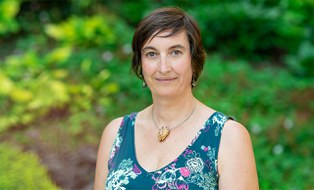 © Crispin Iven Mokry
© Crispin Iven Mokry
Head of Diversity Management
NameDr. Sylvi Bianchin
Send encrypted email via the SecureMail portal (for TUD external users only).
Unit 9.3 Diversity Management
Unit 9.3 Diversity Management
Visiting address:
Verwaltungsgebäude 3, Room 201 Nöthnitzer Str. 43
01187 Dresden

